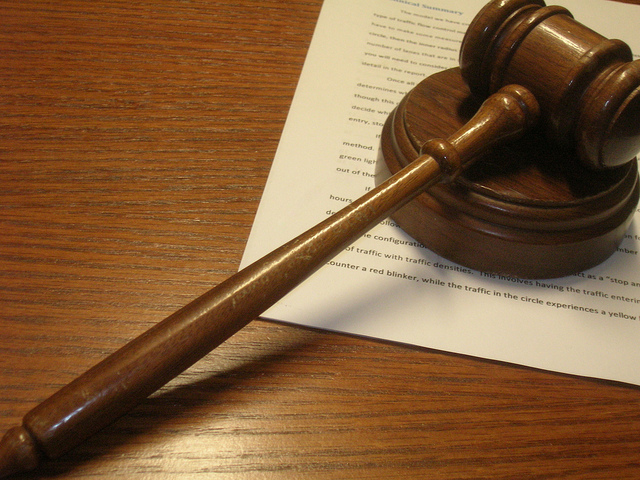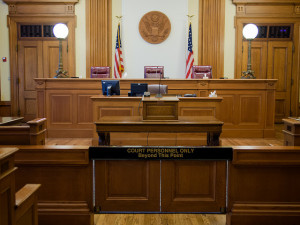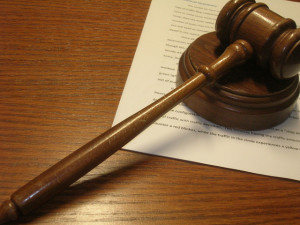Obama’s Nomination: How Garland Can Break the GOP’s Hold on the Senate
 Such a small majority in the Senate could be overturned if just a few GOP senators cross party lines. Image by Flickr Creative Commons: https://flic.kr/p/622SAn
Such a small majority in the Senate could be overturned if just a few GOP senators cross party lines. Image by Flickr Creative Commons: https://flic.kr/p/622SAn
On March 16, 2016, President Obama nominated Merrick Garland to fill Antonin Scalia’s seat on the Supreme Court after Scalia’s death on February 13. Garland has had a long history of serving as a justice, and is currently the chief justice of the US Court of Appeals for the District of Columbia. Garland built his reputation through his involvement with the Oklahoma City Bombing trial, in which he oversaw the prosecution team.
Obama’s intention in naming Garland as Scalia’s replacement can be seen as a tactical political move designed to weaken Republican support moving into November election season. Garland is a moderate democrat, with a long history of Republican support. Days before his nomination, Republican Senator Orrin Hatch said “[Obama] could easily name Merrick Garland, who is a fine man,” in regards to the empty seat on the Supreme Court.
In an appeal to the Republicans in the Senate after the nomination, Obama remarked, “I simply ask Republicans in the Senate to give him a fair hearing, and then an up-or-down vote. If you don’t, then it will not only be an abdication of the Senate’s constitutional duty, it will indicate a process for nominating and confirming judges that is beyond repair.”

However, Senate Majority Leader Mitch McConnell opposed Garland’s nomination, and said that the Senate will not consider a nomination to the Supreme Court until after the presidential elections in November. “It’s about a principle and not a person,” said McConnell. “It seems President Obama made this nomination not with the intent of seeing a nominee confirmed, but in order to politicize it for the purposes of the election.”
In order to understand why such controversy has arisen, it is first necessary to understand who Garland would be replacing. Antonin Scalia described himself as an originalist, which meant that he believed that the constitution should be interpreted in the context it was written in. Notably, Scalia’s rulings frequently coincided with the far right of the political spectrum.Scalia was outspoken in his opinions about race and affirmative action, saying, “There are those who contend that it does not benefit African Americans to get them into the University of Texas where they do not do well, as opposed to having them go to a less-advanced school, a slower-track school where they do well.” His comments about sexuality also sparked outrage. Scalia once remarked, “Homosexual sodomy? Come on. For 200 years, it was criminal in every state.”
Scalia’s comments drew a great deal of controversy from the American left while he was behind the bench. He was described as a “Homophobe” by Barney Frank, a Massachusetts Congressman. His death opens up the possibility of adding a left-leaning judge to the Supreme Court, which would give liberal-minded Justices a majority. This could have long-lasting implications on the American legal system. The precedents created by a left-leaning Supreme Court would stay legally relevant for years, even after the current judges retire.
Therefore, McConnell’s opposition to Garland’s nomination can be seen as a way to try and keep the Supreme Court from leaning left in its future rulings. McConnell is right, however: Obama is calling the GOP’s bluff and daring them to block a Supreme Court nomination. It is important to keep in mind, though, that McConnell is standing on shaky ground. The President of the United States is constitutionally (Article 2, Section 2) allowed to appoint Justices to the Supreme Court, who are then either approved or denied by the Senate. A majority is needed in the Senate for the nominee to officially become a Justice. The current breakdown of the Senate gives the Republicans a slight majority, with 54 of the 100 seats. The remaining 46 seats are divided as such: 44 are held by Democrats, and two are held by independents (Sanders in Vermont and King in Maine), although the latter tend to skew to the left of the political spectrum. Despite their majority, if Republicans refuse to even hear Garland’s case to take the bench, they can be seen as obstructing the political process.

An important development to consider is that Senate elections coincide with the presidential election, both occurring in November. There are seven incumbent Republican senators running in states that voted for Obama in both elections, which means that the Republicans face the real risk of losing senatorial control. If this turns out to be the case, it will not matter if Republicans wait until after the election – their votes wouldn’t matter when it comes to confirming nominees.
Therefore, McConnell is stuck between a rock and a hard place. Already, polls show that most Americans are in favour of the Senate holding hearings to confirm Obama’s nomination, and six GOP senators have indicated that they may be swayed away from their party line, according to Democratic aides. If McConnell holds strong, he might cause division in an already rapidly fracturing party, and lose the majority of the Senate. Moreover, there is no guarantee that he will be able to block Garland’s nomination. Even if McConnell were to back down and allow Senate hearings on Garland’s nomination, he would still appear weak and unable to stand up to a Democratic president moving into election season, which is a dangerous proposition.
Obama’s move to moderate Garland was yet another complication in the disorder that faces the GOP as November gets closer. With Trump currently in the lead, and only Cruz and Kasich left for competition, moderate Republicans are faced with a real issue moving forward. Garland is a reasonable, well-qualified candidate who has received wide praise for his judicial prowess and moderate views from Republicans in the past. By blocking this nomination, the Republicans would have little ground left to stand on. Since Garland is moderate, Republican opposition to the nomination would appear to the public as simple obstinacy, which is allowing party lines get in the way of the proper functioning of the government. Such bad press close to presidential and Senate elections in November could sway voters, and tip the balance of power quite firmly to the Democrats’ favour. Obama has dared the GOP to block the political process against a candidate who is quite favourable towards them and only time will tell which direction the Republicans will decide to follow.
